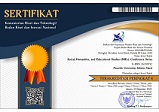The Influence of Differentiated Project-Based Learning Models on IPAS Learning towards School Well-Being in the Era of Independent Learning
Abstract
Low School Well-being (SWB) indicates that many elementary school students do not feel a safe and comfortable learning environment that supports their optimal emotional, social, and academic development. This study aims to: (1) identify SWB in elementary schools, (2) measure the impact of the differentiated PjBL model on the SWB of elementary school students, and (3) analyze the relationship between the differentiated PjBL model and SWB. The research method used in this study is a mixed-methods explanatory sequential design.The total sample for this study consisted of 61 grade V elementary school students. Qualitative data were collected through observation, interviews, and document review. Meanwhile, quantitative data were obtained from the questionnaire results. The instruments used to collect data included observation sheets to measure the differentiated PjBL model and the SWB questionnaire. The results of the study showed that: (1) the level of school well-being was in the high category, (2) the differentiated PjBL model in science learning had a significant positive impact on increasing the SWB of elementary school students. The application of the differentiated PjBL model can improve SWB in the era of merdeka curriculum in elementary schools. This study concludes that the application of the differentiated PjBL model contributes positively to SWB in elementary schools.
Keywords
PjBL, Differentiation, School Well-Being, IPAS, Independent Learning
Full Text:
PDFRefbacks
- There are currently no refbacks.





